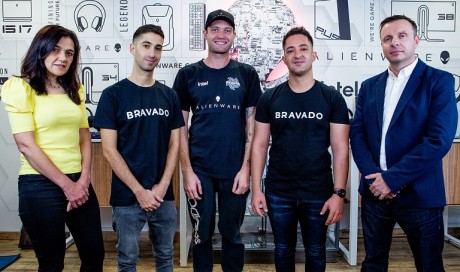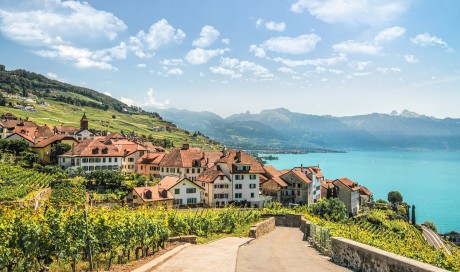Qatar’s first-ever railway system opened to the public at 8am on Wednesday when a state-of-the-art driverless train glided into the Al Wakra Metro Station much to the excitement of waiting commuters.
It was a historic moment for the public transportation network in Qatar, as the Doha Metro Red Line started partial operations, linking Al Wakra in the South to Al Qassar in the North.
The soft launch, which was originally planned for 2020, comes almost a year ahead of schedule.
The nearly 35-minute ride from one end to the other covers 13 stations, including crucial stops such as Msheireb, Corniche and the Doha Exhibition and Convention Centre, which is right next to the City Centre Mall.
Qatar Railways Company (Qatar Rail) said the metro would run from 8am to 11pm on weekdays, with a train arriving at a station every six minutes. The service will be suspended on Fridays and Saturdays to carry out the work required for the opening of more stations and lines.
Eventually, the 13-stop Red Line will be extended to five more stations towards the North to cover areas including Katara, Qatar University and Lusail.
Two more lines — Green and Gold — are under construction, which upon completion in 2020 will take the total number of stations to 37.
Engineer Abdulla Saif al Sulaiti, Chief of Service Delivery at Qatar Rail, said: “The preview service, which is launched ahead of schedule, is a testament of the tremendous efforts carried out by Qatar Rail’s executive teams and board of directors. The preview service is a major opportunity to measure the efficiency of the network and the services we provide. The outputs of the preview service are essential for us, and we will build on them as we prepare for the full opening of the network by 2020.”
There was a palpable air of excitement at the Al Wakra Station as people eagerly waited to get their first public ride in the train.
French Ambassador to Qatar HE Franck Gellet was one among the commuters on the opening day.
“This is a very fast, reliable and eco-friendly means of public transport,” he said, noting that the high-speed electric trains would go a long way in reducing the number of vehicles on the road and consequently their carbon emission.
“This is exciting,” said Indian expatriate and home-maker Jyothi Kongala. The tickets are dispensed by a machine, which accepts both card and cash. Commuters can buy three types of tickets — gold, standard or family.
A gold ticket costs QR10 for a single journey, but gives access to the train’s first cabin that offers large car-like captain seats.
A standard ticket costs QR2 for the same journey and is meant for travel in the second and third cabins, which have side-facing bench seats. As the name suggests, family ticket is meant for families, who can access the gold class cabin.
Metro riders can also go for a day pass for QR6, which enables them to travel multiple times on the metro from 8am to 11pm.
The Gold Class card can be purchased from Gold Club offices, available in all Doha Metro stations. The Limited Use cards are temporary tickets that can be purchased from the tickets vending machines in stations. Their prices vary depending on trips and classes for either a single journey or a day pass.
Standard cards can be purchased from licensed retailers, including Al Meera, Lulu Hypermarket, Carrefour Hypermarket, and Jumbo Electronics.
Qatar Rail has already started selling tickets through Al Meera branches, and will soon begin selling them in the other licensed retailers.
“We have waited for this for a long time — way too long; twenty-eight years precisely,” beamed Josh and Deepthi, an Indian couple.
Sri Lankan expatriate Gihan Rodrigo, an executive with the Al Jaber Engineering, said, “I travel almost 100 kilometres every day from my home in Al Wakra to my office at West Bay and back. I am fed up of driving. The metro is just what I needed,” Hashim Sheikh, who came to Qatar just 14 days ago from India, said the opening of the metro means he can cut his daily commuting expense by around 50 percent.
“I work as an IT engineer at West Bay and stay in Al Wakra. I spend roughly QR70 on taxi every day. On the metro, up and down, it costs me QR4 a day and then some QR15 on taxi from each station,” he said.
A group of 10 to 15 staff members will be present at all stations at any given time, helping the commuters with directions and information. Qatar Rail also offers complementary shuttle service to and from all metro stations. The feeder buses pick up and drop off commuters at designated stops within an 8-kilometre range of each station. So whether one is planning an outing to a mall or a trip to the beach, there will be a ride for all.
Meanwhile, the Qatar Rail has launched an application on smartphones called “Qatar Rail” to assist commuters by providing them with essential information to the locations of stations and their routes.
It has a feature of creating an account for the commuters to register their information and add their “top up” travel card numbers which saves their money in case the card is lost or damaged and issuing a new one.
Besides, the application features several other services such as information about the timing of trains and general information about each station.
Commuters can also plan their trips through the application and find the best and shortest way to reach their destination by leading the passengers to the nearest stations and where to change the train when the other routes are open in the near future.
It also provides users with “real-time” tracking of the trains to keep track with the train trips. The Qatar Rail highly recommended users of the Doha Metro to download this application from Google Play store or Apple Store to make their commutes easier and more convenient.
Furthermore, passengers lived the moments of excitement as the new means of transport finally opened doors to them.
Anantha, a technician at Katara, said he and his three colleagues decided not to take the bus which they usually ride from Barwa Village -- southern Doha – to go to work and used the Metro train instead.
“Now, we can say goodbye to traffic jams and delay in the rush hours, we have used the train which wasn’t far from our accommodation and reached to work in an incredible quick 25 minutes only, we have waited for this moment for so long,” he said.
Anantha like hundreds of other daily commuters issued a rechargeable card to use it in their daily commute.
Not only expatriate workers used the metro rails, citizens also commuted, some to explore and some found it convenient way of reaching destinations. Othman al Ishaq, a citizen was travelling with his nephew Abdulaziz from Wakra to reach the City Centre mall and said it was much faster and more comfortable than driving the car through traffic all that way long and then find a parking. “Thanks God, we now have this beautiful infrastructure in our beloved country and I convey my thanks to the Amir HH Sheikh Tamim bin Hamad al Thani and the wise leadership of our nation.”
Share This Post















